Deadly Hematochezia in Dogs: Causes, Symptoms, and Cure
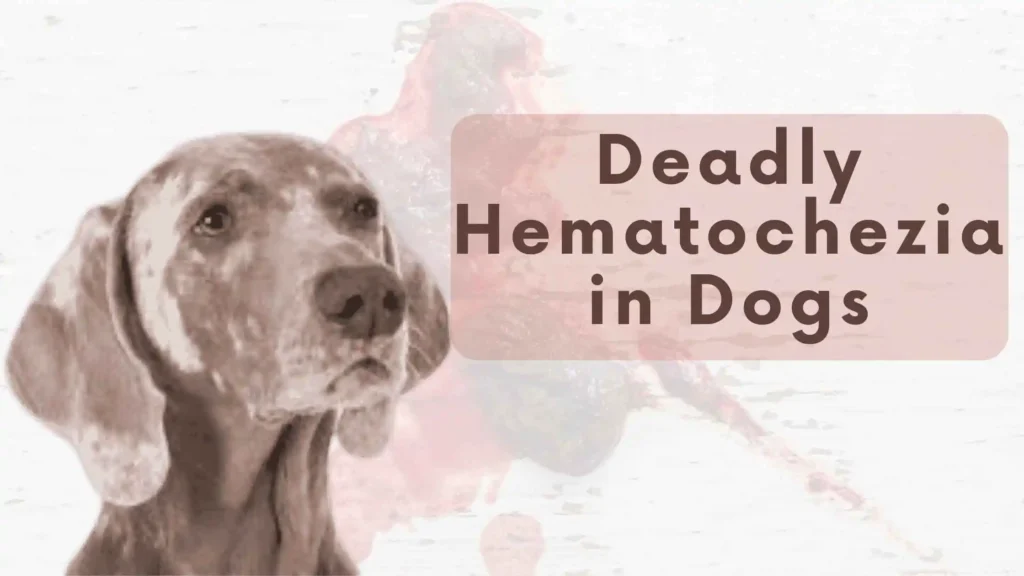
Hematochezia in dogs is a condition that many dog owners are aware of and any time their dog exhibits this symptom, they panic tremendously. The condition occurs when blood bright red passes through the colon and rectum of a dog and mixes in its fecal matter.
Hematochezia is a sign of more alarming conditions in the lower gastrointestinal tract. This is important since they are different, they manifest differently and therefore are treated differently. Hematochezia in dogs can have different causes from simple mild irritation to severe disease.
It is helpful to learn what the medical term ‘hematochezia’ means to approach this subject better. This condition can be brought by stuff that one ingests, which may be unfit or indigestible to our systems, or there may be underlying causes like; tumors or hemorrhagic gastroenteritis.
Let’s explore everything about this dangerous disease to save our precious furry friends.
How to Identify Hematochezia in Dogs
In dogs, detection of hematochezia in dogs is more than merely observing the occurrence of blood in the dog’s intestinal movements. They only know what has been said to them, it’s the context and symptoms that go with it. Hematochezia is characterized by the passage of stool that contains bright red blood or is solely tainted with or coated with blood.
This is a red-colored stool and contains fresh blood and it’s an indication of the lower GIT while melena contains digested blood from the upper GIT. Besides hemorrhagic diarrhea, owners should always look out for other signs since they are essential indications of the cause of the hematochezia.
Hematochezia vs. Melena in Dogs
Here’s a comparison table highlighting the key differences between hematochezia and melena:
| Feature | Hematochezia | Melena |
|---|---|---|
| Appearance | Bright red or fresh blood in feces | Black, tarry, sticky stool |
| Source of Bleeding | Lower gastrointestinal (GI) tract | Upper gastrointestinal (GI) tract |
| Common Causes | Colorectal issues (e.g., hemorrhoids, diverticulosis, colorectal cancer) | Upper GI bleeding (e.g., peptic ulcers, esophageal varices) |
| Digestion of Blood | Blood is usually not digested, appearing fresh | Blood is digested, leading to a dark, tarry appearance |
| Associated Symptoms | May include abdominal pain, rectal pain, or anemia | May include symptoms like nausea, vomiting, or abdominal pain |
| Diagnostic Evaluation | Colonoscopy, sigmoidoscopy, or rectal examination | Endoscopy, upper GI series, or capsule endoscopy |
| Clinical Significance | Indicates a potential issue in the lower GI tract | Indicates a potential issue in the upper GI tract |
| Urgency of Management | Can range from non-urgent to emergency | Often requires prompt medical evaluation |
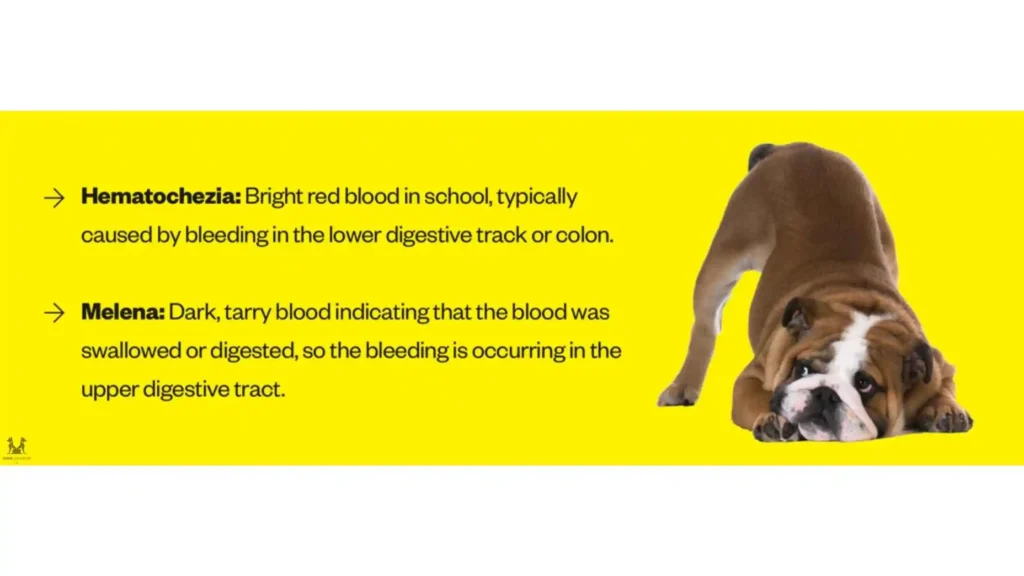
Causes of Blood in Dog Stool
There are several reasons why a dog might develop hematochezia in dogs, ranging from mild to severe:
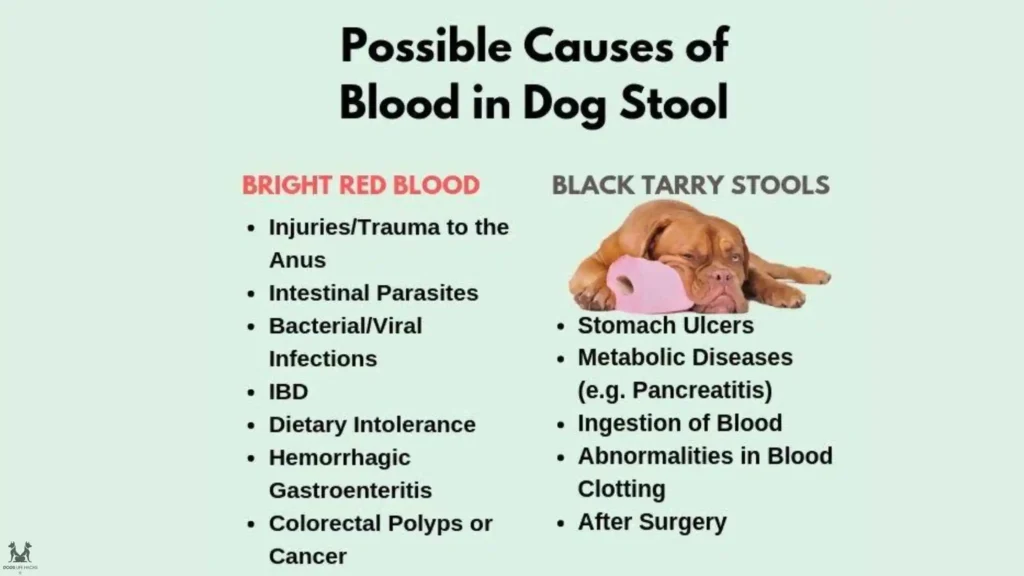
- Gastrointestinal Infections: Inflammation involving bacterial, viral, or fungal infections results in bleeding in the intestinal region hence leading to hematochezia. Parvovirus is among the viral diseases that cause this sign while bacterial infections such as Salmonella also lead to this symptom.
- Dietary Indiscretion: The source extends the information about dogs with their peculiar feature of eating. If they take something that they should not, just like spoilt food, garbage, or objects that should not be taken, it is likely for a patient to develop bloody stools since the intestines are irritated.
- Parasites: Smaller parasites such as hookworm and whipworm burrow themselves on intestinal mucosa leading to inflammation and hemorrhage. This can cause a passage of fresh blood in the stool.
More Severe Causes of Hematochezia
If the condition seems persistent or severe, it might be due to more serious health issues:
- Tumors and Cancer: Benign polyps, malignant tumors, and cancerous colonic and rectal growths are others that may result in bleeding. Although rare it is on the list of possibilities that veterinarians may diagnose when a dog is suffering from hematochezia.
- Hemorrhagic Gastroenteritis: The common features are first, acute, and may be hemorrhagic diarrhea that is often bloody, and vomiting. It should be treated by a vet immediately because it can result in severe dehydration and is fatal at times.
- Trauma or Injury: Accidents leading to physical injury of LI area or postoperative complications of lower gastrointestinal surgery result in fresh bleed per rectum.
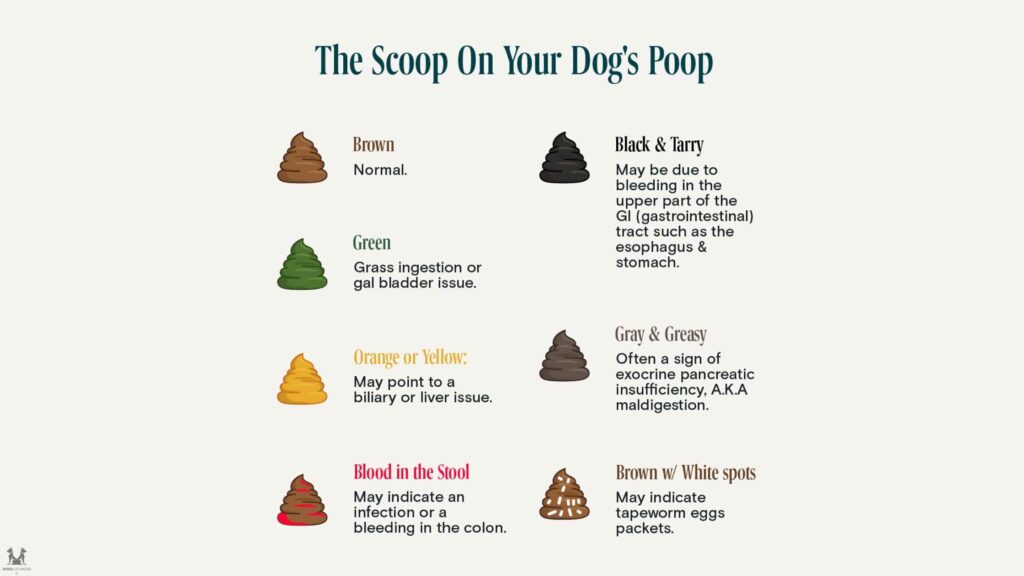
Symptoms of Hematochezia in Dogs
Apart from visible blood in the stool, other symptoms may accompany hematochezia:
Abdominal Pain: Frequently, dogs with hematochezia are seen to be uncomfortable in certain positions, they whine, and they may be restless or hunched up if they feel pain in the abdomen.
Changes in Appetite: For instance, a person may develop a low appetite or avoid eating due to gastric issues or other diseases or conditions that may lead to the development of hematochezia.
When to Seek Veterinary Care
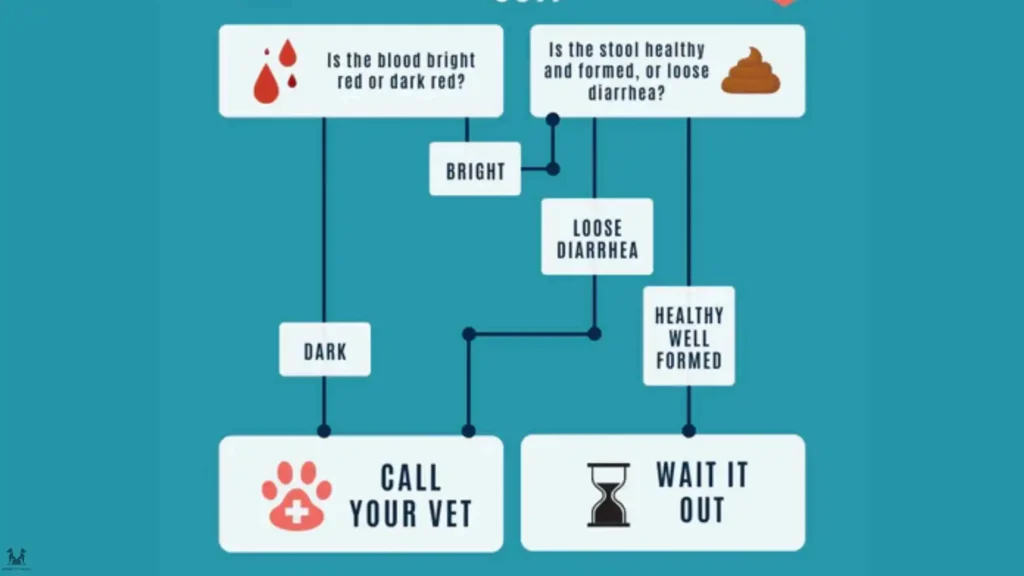
It is not always that black-colored stool would mean that the person has a severe health condition but one should not take chances. If you observe that your dog’s fecal matter has streaks of blood, it should see a veterinarian especially if other symptoms such as vomiting, listlessness, or loss of weight are observed. It is also important to note that the earlier the intervention is made the better the prognosis will be.
Diagnosis of Dog Rectal Bleeding
Diagnosis of hematochezia requires a thorough examination to pinpoint the underlying cause:
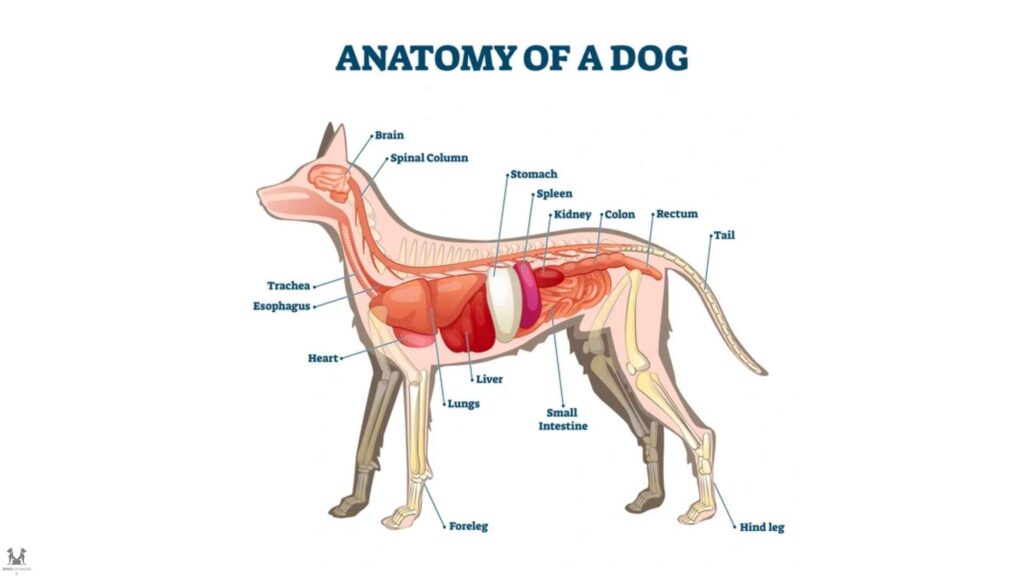
- Physical Examination: Your vet will assess the health of your pet through a complete physical check-up during which he or she will check for signs of abdominal pain, dehydration, or some other signs which may help diagnose the cause of hematochezia. This examination normally involves a rectal examination to assess abnormalities in the lower Gastrointestinal Tract.
- Laboratory Tests: Routine laboratory examinations also include blood tests, fecal examination, and Urinalysis as a means of diagnosing infection, parasites, or any other disease. Fecal examinations may be very helpful in the determination of the parasite presence as well as the bacterial colonies.
- Imaging Techniques: Endoscopy which is a direct examination of the gastrointestinal tract might become necessary to get clear images that would reveal the structures inside the G.I. tract via X-rays or Ultrasound. It aids in the discovery of tumors, foreign bodies as well as the thickened intestine. In some circumstances, endoscopy may be used to obtain a direct visual assessment of the intestine and to obtain tissue samples for histological studies.
Treatment for Hematochezia in Dogs
Treatment for hematochezia varies depending on the underlying cause:
- Dietary Changes: If the hematochezia is because of some particular food food poisoning or food allergy then the vet might advise switching to a low-fiber diet or a particular allergy-producing diet that could reduce inflammation of the gastrointestinal tract.
- Medications: For the treatment, antibiotics may be used differently in case of infection by bacteria, anti-parasitic in case of worm infection, or anti-inflammatory to reduce the inflammation of the intestine. Sometimes medications for the treatment of symptoms such as diarrhea or pain might be administered as well.
- Surgical Intervention: Surgery, for example when the tumor or a foreign body leads to a blockage in the intestines, could be a necessity. The use of surgical interventions is generally done after medical therapies have been tried, or when exactly what is wrong has been identified such as in cancer cases.
Home Care and Management
Post-treatment care is crucial for a dog’s recovery and overall well-being:
- Hydration and Nutrition: Make sure your dog drinks a lot of water especially when sick along with diarrhea or vomiting. Encourage them to take small meals at short intervals, they should take foods that are easy on their stomachs. They should ensure that they take a lot of water since this will ensure that the gut issue does not become worse.

- Monitoring Your Dog’s Progress: Pay particular attention to your dog’s symptoms as well as the form and consistency of their stool and their behavior. In case of observation of any change in the symptoms or development of other symptoms, consult your veterinarian. You should also present your dog to the vet frequently and ensure that you change the treatment plan if the dog is not recovering.
Preventing Blood in Dog Poop
Prevention is always better than cure when it comes to your dog’s health:
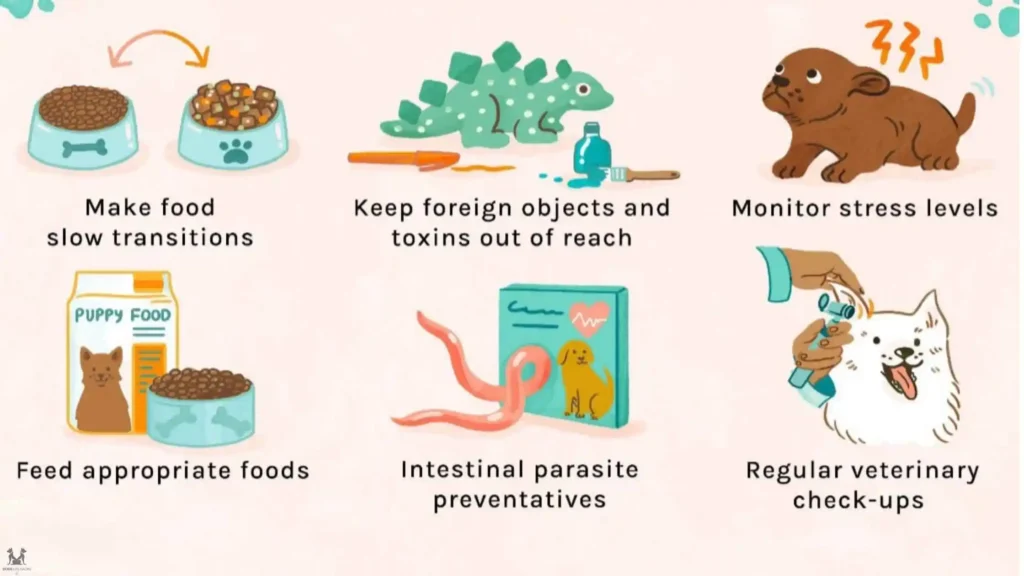
- Routine Veterinary Checkups: It would be wise for a pet to see the vet often so that any emerging diseases are detected at their early stages. In some instances, it can be prevented by identifying and diagnosing the parasitic infections, infections, or other gastrointestinal disorders that cause hematochezia at an early stage.
- Proper Diet: It is therefore recommended that you feed your dog on a balanced and quality diet to avoid digestion problems. Do not offer them food treats from the table or any food that causes them irritation in their stomach. It is also prudent to provide new foods to the child one at a time and look out for any signs of an allergy.
- Parasite Prevention: Periodic medications that help in the treatment of worm infestations accompanied by a proper regime of flea and tick control can lower the chances of parasitic conditions causing pas histolytica to result in hematochezia. However, it is very important that before undertaking any preventive measure for parasites, you seek advice from the veterinarian.
Common Misconceptions About Hematochezia
There are several myths and misconceptions surrounding hematochezia in dogs:
- It’s Just a Minor Issue: Pet owners may not pay much attention to hematochezia thinking it is a condition that will easily clear on its own. Hematochezia might therefore occur due to minor and occasional offenses of dietary habits, but when persistent or in severe circumstances indicates some dangerous underlying medical condition that requires the help of a veterinarian.
- It’s Always Cancer: The sight of blood in the dog stool is something that many panic when they experience or notice in their dogs. But, it is important to note that not all episodes of hematochezia are a result of cancer. Infections, parasites, and other easily curable diseases are also known to be causes of hematochezia. This is especially true when it comes to getting the right diagnosis of the problem.
- All Blood in Stool Is the Same: As has been said earlier, there is a distinction that can be made between hematochezia and melena. The importance of this distinction is that it enables an understanding of the extent and location of the problem. Hematochezia entails blood that originates from the lower end of the gastrointestinal tract while melena is blood that has passed through the stomach and small intestine.
The Importance of Early Detection
Hematochezia in dogs must be treated as early as possible and this will be determined by the kind of treatment to be given. This can compound the situation if the cause of the symptoms is severe as one will neglect the symptoms or delay taking the pet to the vet.
Such diseases as hemorrhagic gastroenteritis demand the beginning of therapy to avoid undesirable consequences, including deadly dehydration. Likewise, detection of tumors at the initial stages can enhance the rates of treatment. That way, you can then be able to seek the best medical care for your dog and prevent the worsening of its health condition.
Long-term Prognosis for Dogs with Hematochezia
The overall survival rates of affected dogs depend solely on the root cause of the hematochezia and timely medical intervention. Dogs with low-level cases like overeating, digestive problems, or simple skin infections have very good outcomes if treated and managed accordingly.

On the other hand, other severe diseases such as cancer or chronic inflammatory bowel diseases may call for lifelong medical therapy and supervision. It is for this reason that if a veterinarian is to diagnose all the symptoms and recommend the right treatment, many dogs can be saved.
Final Thoughts
Hematochezia in dogs is a rather frightening sign; however, awareness of what it might be a sign of, as well as getting the dog to the veterinarian immediately if this changes, may prove to be a lifesaver. In this way, if you feel that there is something wrong with your pet’s gut, get an appointment with your vet for a definite diagnosis, and follow the course recommended, you will be able to help your kitty/k9 regain normal function of their digestive system.
So do not forget that proper nutrition, periodic examination of your dog by a veterinarian, and control of parasites will allow you to minimize the chances of developing hematochezia in your pet.
Frequently Asked Questions
What causes hematochezia in dogs?
Bleeding in this area will compel your vet to look at specific conditions like parvovirus, hemorrhagic gastroenteritis, cancer, viral & bacterial infections, parasites, ingesting the wrong feed, a change in the pet’s diet, rectal injury, and colitis.
How to treat hematochezia in dogs at home?
It may be wise to put your dog on a low-fiber diet for a day or two and if the problem does not persist its course after such a regime then it is likely a simple upset tummy. Steamed white rice with traces of boiled chicken and some cubed unsweetened canned pumpkin, not pumpkin pie filling, should help your dog’s tummy. Once your dog starts to feel better it is advisable that you slowly add the normal food to his diet.
How do you fix hematochezia?
The power depends on the cause but it entails the replacement of the shed blood, identification, and control of bleed. In some cases, medication and topical creams can be used to address the conditions that cause hematochezia and in other severe cases may need surgery.
Why is my dog pooping blood but acting fine?
If all your dog’s feces is bloody, then there could be numerous reasons as highlighted below. These can include worms to gastroenteritis and can also be due to food allergies or eating something they should not be eating. However, one must keep in mind that as far as health is concerned, if your dog is healthy then it is usually not a cause of concern.
Why is my dog’s poop bloody and jelly-like?
Inflammation of the digestive tract can also be the reason for your dog’s pooping blood. Fresh and bright red blood indicates that your dog is having large bowel or lower digestive tract bleeding Your dog’s stool will be bright red or have a jelly-like appearance with streaks of blood.
Related Blogs
- Powerful Home Remedies For Yeast Infection In Dogs Free
- How Much Zyrtec Can I Give My Dog: Safe Dosage and Benefits
- Easy Dog Eye Discharge Home Remedy to Avoid Vet Visit
